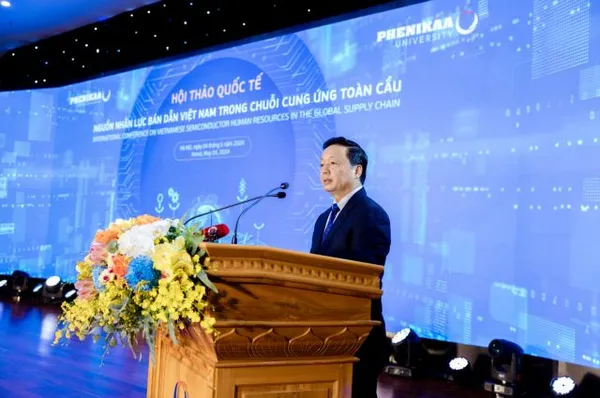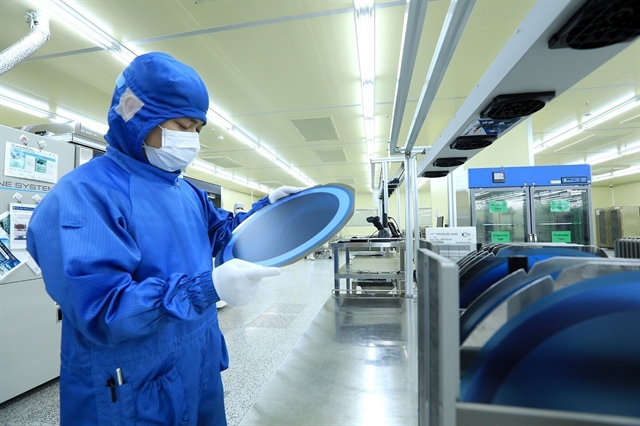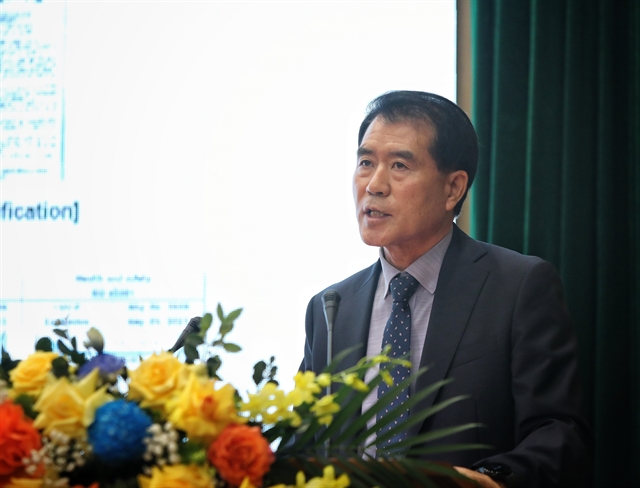 Economy
Economy

 |
| Production at Hana Micron Vina in Bắc Giang Province. The northern province aims to cultivate a highly skilled workforce for the semiconductor industry. — VNA/VNS Photo Tuấn Anh |
HÀ NỘI — Bắc Giang Province is focusing on developing a high-skilled workforce to bring in investments in the semiconductor industry and seize the chance to make the most of developments in a digital era.
The important role of the semiconductor industry in global economic development has been recognised. The province has organised a special forum to discuss how to get a bigger and better local workforce.
There are three enterprises operating in the semiconductor industry in the province, including Hana Micron Vina and Si Flex Việt Nam, with Korean part investment and Synergie Cad Việt Nam, which has French investment.
Together, the companies employ more than 8,000 workers, predominantly degree and college graduates, with majors in automation, electronic engineering, information technology, mechanical engineering and chemical technology.
Nguyễn Xuân Ngọc, Deputy Head of Bắc Giang Province’s Management Board of Industrial Parks, said that more companies in the semiconductor sector are expected to arrive in local industrial zones and the workforce will be expanding. It will need an additional 1,866 employees by the end of 2024 and 6,300 in the 2025-30 period.
Because the semiconductor industry is a relatively new venture for Bắc Giang in particular and Việt Nam in general, the number of employees with the right skills remain limited.
Thus, Vietnamese employees typically require on-the-job training upon starting work in the semiconductor sector.
 |
| Chung Won Seok, general director of Hana Micron Vina Limited Liability Company. speaks at the workshop on finding solutions to a skilled and expanded workforce for the semiconductor industry. — VNS Photo |
According to Chung Won Seok, general director of Hana Micron Vina Limited Liability Company, Hana Micron, the company has ambitious growth plans for the new semiconductor industry ecosystem in Việt Nam.
By 2025, the company plans to increase investment in Bắc Giang from US$600 million to $1 billion and provide jobs for nearly 3,000 people, with 70 per cent being Vietnamese. The company forecasts revenues of around $800 million.
Solutions
Bắc Giang currently has a working-age population of 1.1 million, with 76 per cent having received training, including graduates from local colleges.
Bắc Giang Việt Nam – Korea College of Technology is one of the local colleges that has collaborated with Hana Micron Vina for training students, organising internships and running recruitment drives after graduation.
On November 11, 2023, 62 students from the college of technology, started work at Hana Micron Vina.
Nguyễn Công Thông, the college's principal, said the college has recently earmarked a separate area for training, research and development and technology transfer just for semiconductor enterprises.
The local authority is also asking the college to focus on skills training for the semiconductor industry, to serve both companies in the northern province and even send workers to other localities and even international markets, the principal added.
Võ Xuân Hoài, Deputy Director of the National Innovation Centre under the Ministry of Planning and Investment, urged Bắc Giang to strengthen international cooperation with the countries who excel in the semiconductor industry such as the US, Japan, the Republic of Korea, the Netherlands, Belgium, France and Germany.
He asked training and education establishments to enhance their capacity for education and training, as well as to upgrade their facilities to promote research and development.
Standing Deputy Chairman of the provincial People’s Committee Mai Sơn said that agencies and organisations should work with the provincial Department of Labour – Invalids and Social Affairs to develop a plan to create a suitable workforce for the semiconductor industry and artificial intelligence by 2030. The plan should be completed and submitted for consideration in June. — VNS




